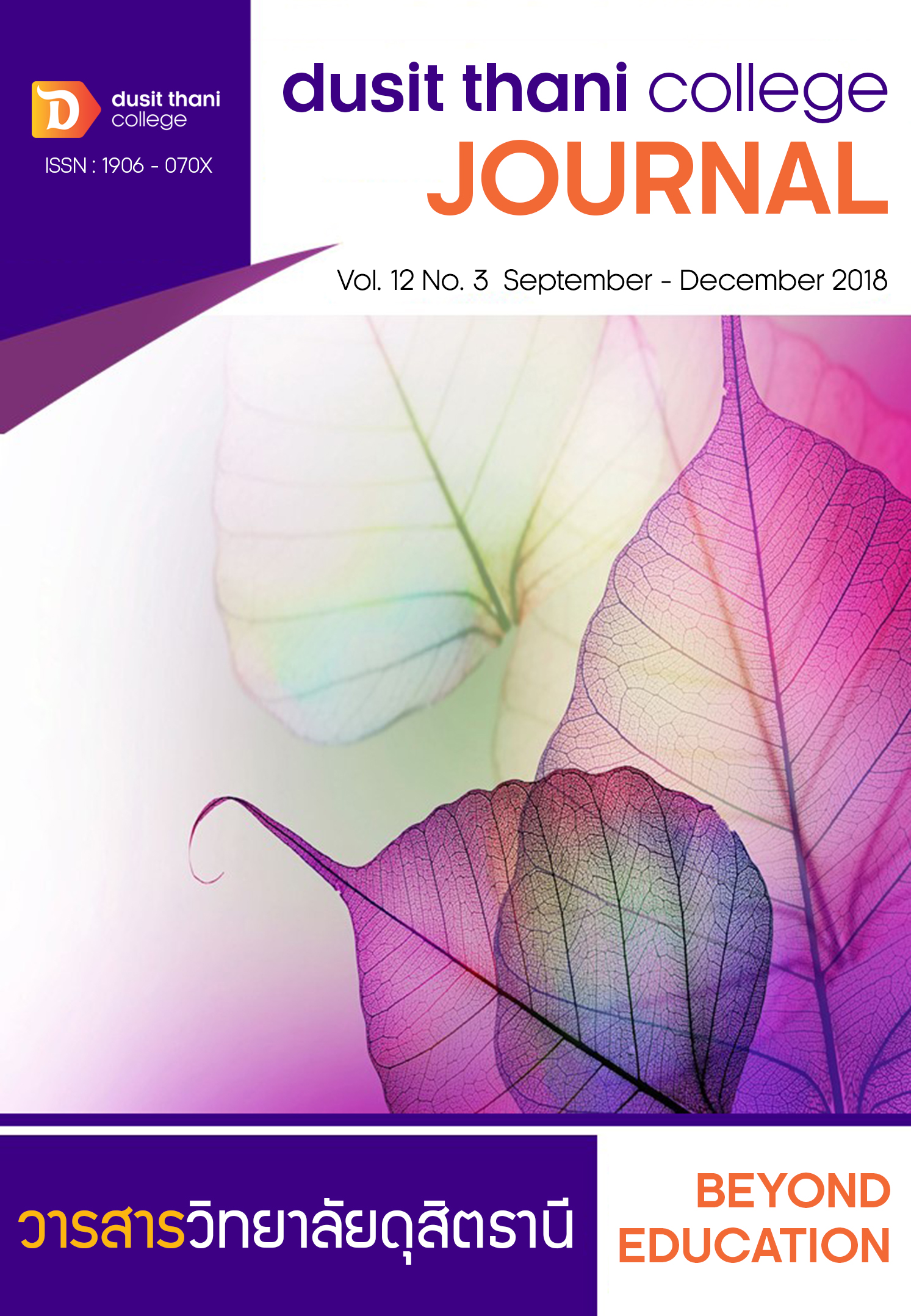The Accomplishment of Thainess Enhancement Using Drama-Based Instruction Program for Undergraduate Students
Main Article Content
Abstract
Thainess enhancement using drama-based instruction program for undergraduate students was an experimental research aims to increase knowledge about Thai culture and the pride to be Thai for undergraduate students in higher education institutions through general education subjects. This program was experimented with 24 undergraduate students for 1 semester or 48 hours. Pre-post examination, field observer form, self-reflection note and exercises were used to collect data. The results of this program revealed that students’ knowledge increased dramatically. The level of students’ pride also augmented sharply. The program overall score is ranked in the most satisfaction level. In short, Drama-based instruction is an alternative method for teaching and learning in higher education institution nowadays.
Article Details
Article Screening Policy
- All research and academic articles to be published must be considered and screened by three peer reviews in the relevant field / article.
- All articles, texts, illustrations and tables published in the journal are the personal opinions of the authors. Editors don't always have to agree. And no responsibility whatsoever is the sole responsibility of the author.
- The articles to be published must never be published. Where did you first publish? And not in the consideration of other journals If the audit found that there has been a duplicate publication It is the sole responsibility of the author.
- Any article that the reader sees as being plagiarized or impersonated without reference. Or mislead the work of the author Please let the journal editor know it will be your greatest blessing.
References
2. Chanpolydet, Mer. (2016). “Five Ways to Preserve Your National Identity.” in The Phnom Penh Post. [online]. Available: www.phnompenhpost.com/lift/5-ways-to-preserve- your-national-identity. Retrieved May 12, 2016.
3. Chantavanich, Supang. (2011). Qualitative Research Methodology. 19th Edition. Bangkok: Dan Sutha. Chickering, Arthur and Reisser, Linda. (1993). Education and Identity. San Francisco: Jossey- Bass.
4. Chutintaranond, Sunait. Editor. (2014). Nationalism in Thai Textbooks. 2nd edition. Bangkok: Matichon Press.
5. Chutintaranond, Thanasin. (2016). Thainess Enhancement Using Drama-Based Instruction for Undergraduate Students. Ph.D. dissertation, Faculty of Education, Chulalongkorn University.
6. Dhamrung, Pornrat. (2004). Drama for Youth. Bangkok: Chulalongkorn University Press.
7. Dhamrung, Pornrat. (2014). Applied Theatre: Using of Drama for Development. Bangkok: Chulalongkorn University Press.
8. Diamond, Robert. (2009). Designing and Assessing Courses and Curricula. 3rd Edition. San Francisco: Jossey-Bass.
9. Freire, Paulo. (1996). Pedagogy of the Oppressed. London: Penguin.
10. Frick, Unw. (2014) An Introduction to Qualitative Research. 5th Edition. London: Penguin.
11. Heathcote, Dorothy and Bolton, Gavin. (1995). Drama for Learning. New Hamshire: Heineman.
12. Josselson, Ruthellen. (1987). Finding Herself: Pathways to Identity Development in
Women. San Francisco: Jossey-Bass.
13. Juengwiwatthanaporn, Parichart. (2004). Creative Drama for Children. Bangkok: The
Development of Academic Quality Press.
14. Kanjanawasee, Sirichai. (2005). Classical Test Theory. 5 th Edition. Bangkok: Chulalongkorn University Press.
15. Mahachakri Sirindhorn, Her Royal Highness. (1985). Princess’s Royal Guidance. [online].
Available: www.lib.ru.ac.th/speech/2528DEC24A.pdf. Retrieved May 6, 2016.
16. Marcia, James. (1976). Studied in Ego-Identity. British Columbia: Simon Frazer University.
17. Merriam, Sharan and Tisdel, Elizabeth. (2016). Qualitative Research: A Guide to Design and Implementation. 4th Edition. San Francisco: Jossey-Bass.
18. Ministry of Culture. (2009). National Culture Master Plan 2007 – 2016. Bangkok:
Ministry of Culture.
19. Ministry of Culture. (2010). Royal Thai Government Gazette. 127(69): 29-39.
20. Ministry of Culture and Ramajitti Institute. (2005). Life and Thainess. [online]. Available:
21. Ministry of Education. (1999). Royal Thai Government Gazette. 116(74): 1-21.
22. Ministry of Education. (2006) . Royal Thai Government Gazette. 123(105): 5-7.
23. Ministry of Education. (2011) . Royal Thai Government Gazette. 128(47): 44-46.
24. Ministry of Education. (2015). Royal Thai Government Gazette. 132(295): 2-11.
25. Ministry of Social Development and Human Security. (2008). Royal Thai Government Gazette. 125(9): 1-15.
26. Ministry of Social Development and Human Security. (2010). Thainess: A Way to Sustainability. Bangkok: Kyodo Nation Printing Services.
27. Ministry of University Affairs. (n.d.) Student Affairs Standardization. Bangkok: [n.p.].
Mynt, Than Than. Burmese Lecturer, Faculty of Arts, Chulalongkorn University. (Interview) May 16, 2016.
28. Nakorntap, Amornwit. Et al. (2011). Thai Children in Culture Dimension. Bangkok:
Ministry of Culture.
29. Na-Nakorn, Supab. Et al. (2004). The Analysis of Ideal Graduate Development Pattern. Bangkok: OCSC. Ngam-mook, Patriya. (2006). “Students’ Culture in Creative Industry Era.” in Executive Journal. 26(3): 62-67.
30. Ojemudia, Christine Chika. (2013). “Drama as an Instrument for National Identity Formation.” in Unizik Journal of Arts and Humanities. 24(3): 33 – 44.
31. Pasiphol, Shotika. (2013) Measurement and Evaluation. Bangkok: Chulalongkorn University Press.
32. Sauerhoff, Emaily. (2011). “Irish National Identity and Irish Drama: A Social Psychology Analysis.” in Honours Psychology Symposium 2010 – 2011. Georgetown: Georgetown University.
33. Sinlarat, Paitoon. (2014). Principle and Foundation of Higher Education. 2nd Edition. Bangkok: Chulalongkorn University Press.
34. Srisa-arn, Wijit. (1975). Principle of Higher Education. Bangkok: Wattana Panich.
35. Swale, Jessica. (2013). Drama Games for Classrooms and Workshops. 10th Edition. London: Nick Hern Book.
36. Uaesilapa, Sanchai. Dean, Faculty of Music and Performing Arts, Burapa University. (interview) May 4, 2017.


